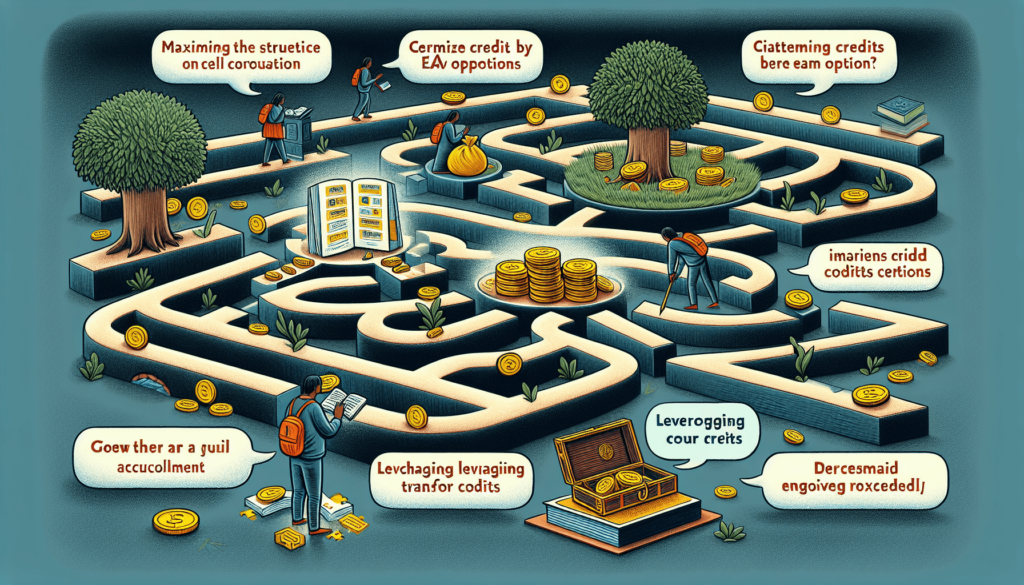Is earning an associate degree in one year feasible? This article offers a decisive yes, guiding you through the rigorous yet rewarding path of accelerated education. Explore the nuts and bolts of accelerated degree programs, the entry requirements, and strategic advice on how to maximize your year for a swift and successful graduation.
Key Takeaways
- Accelerated associate degree programs can be completed significantly faster than traditional programs, often within one year, by focusing on fewer general education credits and allowing for credit transfer and condensed courses.
- Students can fast-track their education by earning and transferring credits before and during their program enrollment through approaches such as Advanced Placement (AP) credits, dual enrollment, the College-Level Examination Program (CLEP), and recognition of prior learning and military experience.
- Online accelerated degree programs offer flexibility and self-paced learning, supporting students through services such as tutoring and career advising, while potentially reducing tuition costs and other expenses associated with on-campus programs.
Understanding Accelerated Associate Degree Programs

Accelerated associate degree programs offer a unique approach to higher education. Instead of the standard two-year timeline of traditional programs, these accelerated versions can be completed in approximately 18 months, and in some cases, as quickly as one year. How is this possible? The answer lies in the program’s focus on fewer general education credits and the allowance for credit transfer.
For instance, Ivy Tech offers the opportunity to earn an associate’s degree in just one year, a 50 percent reduction from the standard time commitment.
The Structure of an Accelerated Program
The structure of accelerated programs is designed to facilitate rapid progression towards degree completion. Unlike traditional courses that typically span 14 weeks, courses in accelerated programs are condensed into intensive seven to eight-week formats.
This structure of multiple consecutive short terms throughout the academic year allows students to progress more rapidly, making the fast-track to degree completion a reality.
Eligibility Criteria for Accelerated Programs
Being eligible for accelerated programs goes beyond just having a high school diploma or equivalent. High school graduates, as prospective students, are expected to possess strong analytical and critical thinking skills, often developed through liberal arts education, as these programs are intensive and fast-paced. Science degrees, in particular, require a strong foundation in these skills.
Previous educational achievements, such as advanced or honors classes taken in high school, can also be a plus, as they indicate a readiness for accelerated learning.
Comparing Traditional vs. Accelerated Timelines
When compared to traditional timelines, the benefits of accelerated programs are clear. While the average time to complete an associate degree is two years, accelerated associate degree programs, such as the one at Milwaukee Area Technical College, can be completed by full-time students in just one year. Abbreviated terms offered by many colleges enable students to complete accelerated associate degrees in as few as six to twelve months, depending on transfer credits.
Fast-Track Strategies: Maximizing Credit Accumulation

For those eager to earn their degrees at a faster pace, there are several strategies to maximize credit accumulation. The College-Level Examination Program (CLEP) is one such strategy, providing an opportunity to quickly earn college credits by demonstrating mastery of subject material through standardized exams.
Additionally, credits can be rapidly accumulated through recognition of prior learning.
Earning Credits Before Enrollment
Did you know that high school students can begin earning college credits even before they enroll in a degree program? Advanced Placement (AP) credits and dual enrollment programs allow high school students to earn college credits, potentially enabling them to complete their degree ahead of schedule.
Moreover, the College-Level Examination Program (CLEP) offers over 34 different exams, each successful one earning a minimum of three college credits which are recognized by more than 2,900 colleges and universities in the U.S.
Leveraging Transfer Credits
Transfer credits are another effective strategy to fast-track your degree program. If you have prior academic credits, such as an associate’s degree, it’s crucial to verify with admissions if these credits are transferable to the accelerated program. Even military training and experience can be converted into college credits, as evaluated by over 2,300 educational institutions.
Testing Out of Courses
Testing out of courses is another strategy to earn credits more quickly. The College-Level Examination Program (CLEP) allows students to earn credits for introductory courses by passing exams, which enables them to advance more quickly to higher-level courses.
Similarly, University Challenge Exams (CBEs) provide a pathway for students to earn undergraduate credits or fulfill graduate course requirements by proving their knowledge in a specific subject area.
Balancing Rigor with Flexibility: Online Accelerated Degrees

Online accelerated degrees are a popular choice for many students, thanks to their flexibility and self-paced learning options. These programs allow students to manage work and life commitments while still earning a degree. Plus, online learners often benefit from lower tuition rates and the elimination of commuting and relocation expenses.
For instance, community colleges like Cleveland Community College offer an online accelerated associate degree program with a year-round course schedule in business concentration.
Self-Paced Learning and Time Management
Self-paced online courses provide the following benefits:
- Flexibility to set your own schedule and deadlines
- Ability to study around existing personal and professional commitments
- Opportunity to practice effective time management
- Creation of personal goals and deadlines to stay on track with degree progress
These benefits make self-paced online courses a great option for many students.
Technology Requirements for Online Learning
To participate effectively in online accelerated degree programs, it’s crucial to have a stable internet connection and a functional computer. Reliable internet access and appropriate devices are particularly important for engaging with virtual learning environments and recorded lectures and videos.
Support Systems for Accelerated Online Students
Despite the fast-paced nature of online accelerated programs, students are not alone in their academic journey. These programs offer support services like tutoring, career advising, and counseling to assist students.
Additionally, colleges, including those for community college students, offer academic advising and mental health services to help students cope with the fast pace and stress of accelerated degree programs.
Career Pathways with an Accelerated Associate Degree

Graduating from an accelerated associate degree program opens up a world of career opportunities. Some fields that hire associate degree holders include:
- Criminal justice
- Business administration
- Healthcare administration
- Information technology
The possibilities are varied and numerous.
From Classroom to Career: Job Prospects
The job prospects for associate degree holders are vast and varied. Common job titles and sectors for education degree holders include positions such as:
- Teaching assistants
- Paraprofessionals
- Preschool teachers
- Daycare providers
- Roles in educational support services
Continuing Education: Bridging to a Bachelor’s Degree
For those looking to further their education, credits earned in associate degree programs can be applied toward general education requirements and potentially transferred to bachelor’s degree programs, ultimately leading to a college degree.
The ROI of an Accelerated Degree
The return on investment (ROI) of an accelerated degree is considerable. Besides the lower tuition costs compared to traditional four-year degrees, graduates with an associate degree can expect to earn $41,496 per year on average, while bachelor’s degree holders average $59,124 annually.
Financial Considerations for Accelerated Degree Seekers

Pursuing an accelerated degree requires careful financial planning. For instance, the accelerated associate degree program offered by Ivy Tech costs approximately $7,000, which is significantly less than traditional two-year programs for the same degree.
Tuition and Fees for One-Year Programs
The cost of tuition and fees for one-year programs can be influenced by a variety of factors such as the type of institution offering the program, the program format, and the program’s geographic location.
Accessing Financial Aid and Scholarships
Financial aid and scholarships can ease the financial burden of pursuing an accelerated degree. Students enrolled in these programs can apply for federal grants and scholarships to help cover the cost of tuition and related expenses.
Budgeting for an Intensive Program
Effective budgeting is crucial for managing the financial demands of an accelerated degree program. This includes setting aside a portion of the budget for savings to prepare for unexpected expenses and long-term goals.
Choosing the Right Accelerated Associate Degree Program
Choosing the right accelerated associate degree program is a critical step in your academic journey. Key considerations include:
- The program’s courses and learning outcomes
- The quality of faculty
- Support services
- The process for transferring credits
Accreditation and Quality Assurance
Accreditation is a significant factor to consider when choosing an online program from an accredited university. It’s a sign that the program has been rigorously evaluated and meets high educational standards. Furthermore, employers often look for accreditation when evaluating the qualifications of job applicants.
Program Specializations and Curriculum Focus
The choice of program specialization should align with your educational and career goals, providing you with a focused curriculum that caters to the particular knowledge and skills required in your chosen career field.
Reviews and Student Experiences
Lastly, independent evaluations and studies can provide valuable insights into the effectiveness of accelerated associate degree programs. Reviews and student experiences can offer a real-world perspective on what to expect from these programs.
Preparing for an Accelerated Learning Experience
Preparing for an accelerated learning experience involves a careful assessment of your ability to handle the high workload and rigorous academic schedule of accelerated courses. It also requires the development of effective time management strategies.
Academic Readiness and Skills Development
Academic readiness for an accelerated program requires:
- Robust study habits
- The ability to quickly grasp new material
- Strong motivation
- Unwavering commitment
- Proficient time management skills
These qualities are essential for success.
Balancing Life and Study
Balancing personal and work commitments alongside studies is crucial in an accelerated program. Effective management of these different aspects of your life can help you maintain balance and stay on track with your academic goals.
Expectations and Outcomes
Expectations and outcomes for accelerated programs involve managing a high workload, adhering to a rigorous academic schedule, and developing effective stress management techniques. It’s also important to engage with peers, support groups, and mentorship programs to help ease the pressures of a condensed study timeline.
Summary
In conclusion, accelerated associate degree programs offer a unique and fast-paced path to higher education. These programs provide a condensed timeline, a focused curriculum, and the flexibility to balance work and life commitments. By carefully choosing the right program, leveraging transfer credits, and effectively managing your time and resources, you can earn an associate degree in one year and fast-track your way to a rewarding career.
Frequently Asked Questions
An accelerated associate degree program is a fast-paced option that enables you to complete an associate degree in less time than a traditional two-year program, sometimes in as little as one year.
You can earn credits quickly in an accelerated program by taking advantage of transfer credits, CLEP and University Challenge Exams, as well as AP courses and dual enrollment programs—these options can help you progress at a faster pace.
Online accelerated degrees offer flexibility, self-paced learning, lower tuition rates, and eliminate commuting and relocation expenses, making it easier to manage work and life commitments while earning a degree.
When choosing an accelerated associate degree program, consider factors such as accreditation, course offerings, faculty quality, support services, and credit transfer process. These factors will ensure you select a program that meets your academic and career needs.
To prepare for an accelerated learning experience, you should assess your readiness, develop strong study habits and time management skills, and manage your expectations and outcomes. Good luck with your preparations!






